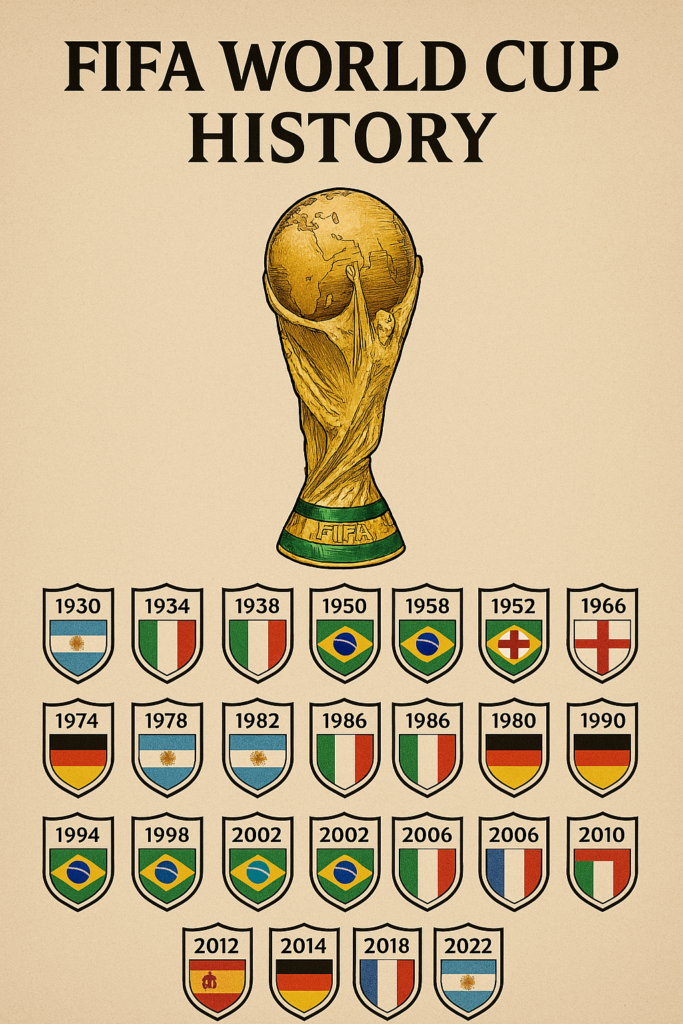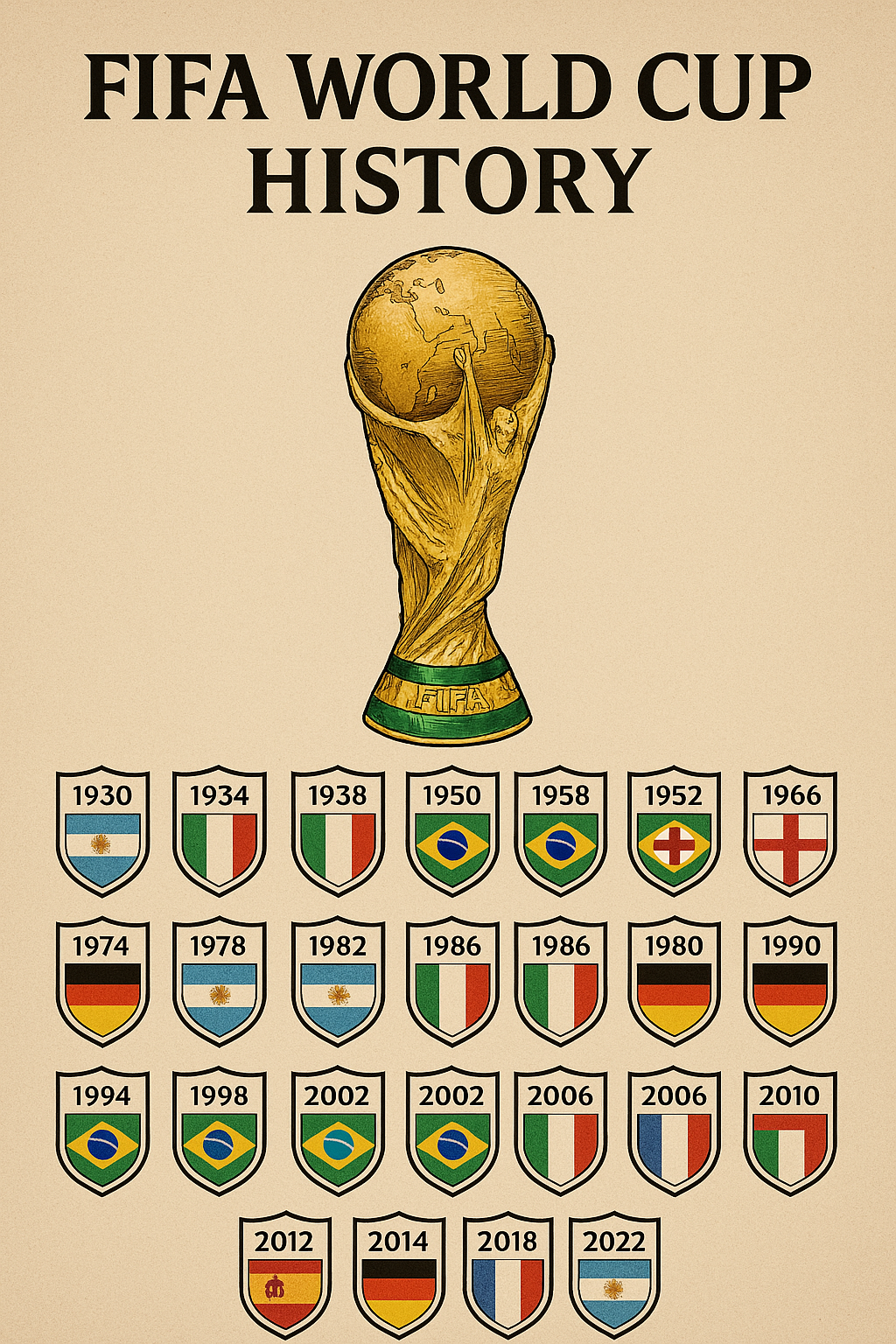Explore the rich history of the FIFA World Cup, from its origins in 1930 to the unforgettable moments and records that have shaped this iconic tournament. Discover how the World Cup has evolved into the most prestigious event in footballThe FIFA World Cup history is one of the most fascinating stories in the world of sport. For over nine decades, this prestigious international football tournament has captured the imagination of billions across the globe. It represents more than just a competition—it symbolizes national pride, global unity, and the spirit of sportsmanship. In this article, we will take you through the FIFA World Cup history, tracing its origins, milestones, and the unforgettable moments that have defined its evolution.
Table of Contents
- Introduction to the FIFA World Cup
- The Birth of the FIFA World Cup
- Early Years: The 1930s and the Founding of the Tournament
- World War II and the Interruption of the World Cup
- Post-War Resurgence: The 1950s and 1960s
- The Golden Age of Football: The 1970s and 1980s
- Modern Era: The 1990s to Present
- The Most Iconic FIFA World Cup Moments
- FIFA World Cup Records and Achievements
- Conclusion: The Legacy of the FIFA World Cup
1. Introduction to the FIFA World Cup History
The FIFA World Cup history begins in 1930 when the tournament was first established. Since then, it has become the most-watched and most prestigious football competition in the world. Every four years, national teams from around the globe compete for the title of World Champion. The event brings together people from diverse cultures, uniting them through their shared love of football.
The tournament has evolved dramatically since its inception, expanding in size and significance. From the initial competition featuring a handful of teams to today’s 32-team global event, the FIFA World Cup history continues to grow in prominence. This article delves into the history of the FIFA World Cup, from its humble beginnings to its current place as a global spectacle.
For more on the history of the World Cup, visit FIFA’s official website.

2. The Birth of the FIFA World Cup
The idea of creating a world championship for football originated in the early 20th century. At the time, several regional tournaments existed, but there was no formal global competition. In 1904, FIFA was founded in Paris, with the mission of overseeing international football. Over the years, the organization began to consider the idea of hosting a global football tournament.
It wasn’t until Jules Rimet, the FIFA president from 1921 to 1954, that the idea was formally proposed. Rimet was passionate about expanding football globally, and in 1928, he convinced FIFA to organize the first-ever FIFA World Cup. The inaugural tournament was held in Uruguay in 1930, marking the beginning of what would become the most prestigious event in football history.
Learn more about the FIFA World Cup history at FIFA’s history page.
3. Early Years: The 1930s and the Founding of the Tournament
The inaugural FIFA World Cup was hosted by Uruguay in 1930. The tournament featured 13 teams, including Argentina, Brazil, Chile, and Mexico. The host nation, Uruguay, was selected to host the competition to celebrate the country’s centenary of independence. The tournament was held in Montevideo, with the Estadio Centenario serving as the main venue.
The event’s format was simple, and there were no qualification rounds. FIFA The tournament’s early matches saw competitive play, with Uruguay eventually emerging victorious, defeating Argentina 4-2 in the final to claim the first-ever World Cup title.
For more about the iconic Estadio Centenario, visit its official website.
4. World War II and the Interruption of the FIFA World Cup
With the onset of World War II, the FIFA World Cup was suspended for 12 years. The tournaments scheduled for 1942 and 1946 were canceled due to the global conflict. With many countries involved in the war, organizing the World Cup became impossible.
After the war, there was a strong desire to bring the tournament back. In 1950, the World Cup returned with the Brazilian tournament, marking the first competition after the war. This edition saw the rise of new footballing nations and introduced exciting new formats, though the dramatic final match between Brazil and Uruguay remains one of the tournament’s most iconic moments.
Check out the post-war FIFA World Cup in-depth at Britannica’s article.
5. Post-War Resurgence: The 1950s and 1960s
The 1950 World Cup in Brazil was the first tournament held after the war and marked a new era for the competition. The tournament was significant because it introduced innovative ideas such as the round-robin format for the final stages. One of the most memorable moments of this World Cup was the final match in which Uruguay defeated Brazil 2-1 in front of a massive crowd at the Maracanã Stadium.
The 1954 World Cup in Switzerland was notable for being the first tournament televised globally. The event saw West Germany, which claimed its first title by defeating Hungary 3-2 in the final.
Check out the Maracanã Stadium’s history and its role in World Cup events.
6. The Golden Age of Football: The 1970s and 1980s
The 1970s and 1980s are often considered the “golden age” of football. This period saw the rise of legendary football players and teams. The 1970 World Cup in Mexico was particularly significant for its introduction of color television, bringing the tournament into homes across the globe.
Brazil, led by Pelé, dominated the 1970 tournament, winning their third title in a stunning final against Italy. Pelé’s brilliant performances throughout the tournament cemented his place as one of the greatest footballers of all time. This victory marked Brazil as the first nation to win three World Cup titles, ensuring that they would keep the original Jules Rimet Trophy.
To learn more about Pelé’s legacy, visit his official website.
The 1986 World Cup in Mexico is another iconic moment in FIFA World Cup history. Argentina, led by Diego Maradona, won their second World Cup title. Maradona’s individual performances, including his famous “Hand of God” goal and his brilliant solo effort against England in the quarter-finals, have become defining moments of the tournament.
7. Modern Era: The 1990s to Present
The 1990s brought significant changes to the FIFA World Cup. The 1994 World Cup, held in the United States, was the first to be hosted outside of Europe and South America. The event saw Brazil win their fourth title, defeating Italy in a penalty shootout after a goalless final. This tournament also marked the beginning of a new era in the commercialization of football, with greater media coverage and sponsorship deals.
In 1998, the tournament expanded to include 32 teams, further globalizing the event. France won their first World Cup on home soil, defeating Brazil 3-0 in the final.
To keep up with the latest updates on FIFA World Cup tournaments, explore FIFA’s tournament page.
8. The Most Iconic FIFA World Cup Moments
Throughout the FIFA World Cup history, numerous iconic moments have captured the world’s attention. Some of the most unforgettable moments include:
- Pelé’s Hat-Trick in 1958: Pelé’s hat-trick in the semi-final against France announced him as the future of football.
- Maradona’s Hand of God (1986): Maradona’s controversial goal against England remains one of the most debated moments in World Cup history.
To explore more iconic moments in football, check out Bleacher Report’s football section.
9. FIFA World Cup Records and Achievements
Over the years, the FIFA World Cup has seen numerous records broken. Some of the most notable include:
- Most Titles: Brazil holds the record with five World Cup titles (1958, 1962, 1970, 1994, 2002).
- Most Goals in a Tournament: Just Fontaine of France scored 13 goals in the 1958 World Cup, a record that still stands today.
Explore more about World Cup statistics and player records in our section on FIFA statistics.
10. Conclusion: The Legacy of the FIFA World Cup
The FIFA World Cup history is one of passion, triumph, and global unity. From its modest beginnings in 1930 to the modern-day spectacle that captivates billions, the World Cup remains the ultimate celebration of football. Whether through unforgettable goals, incredible players, or dramatic matches, the World Cup continues to be an event that transcends borders and unites nations.
For a deeper dive into the legacy of the FIFA World Cup, visit Sports Illustrated’s coverage.






One thought on “FIFA World Cup History: A Journey Through the Most Prestigious Football Tournament (1930)”